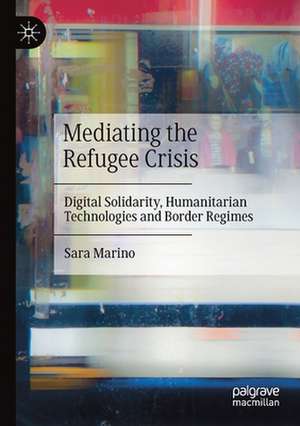Mediating the Refugee Crisis: Digital Solidarity, Humanitarian Technologies and Border Regimes
Autor Sara Marinoen Limba Engleză Paperback – 31 aug 2021
| Toate formatele și edițiile | Preț | Express |
|---|---|---|
| Paperback (1) | 634.82 lei 6-8 săpt. | |
| Springer International Publishing – 31 aug 2021 | 634.82 lei 6-8 săpt. | |
| Hardback (1) | 639.25 lei 6-8 săpt. | |
| Springer International Publishing – 31 aug 2020 | 639.25 lei 6-8 săpt. |
Preț: 634.82 lei
Preț vechi: 746.84 lei
-15% Nou
Puncte Express: 952
Preț estimativ în valută:
121.49€ • 126.37$ • 100.30£
121.49€ • 126.37$ • 100.30£
Carte tipărită la comandă
Livrare economică 14-28 aprilie
Preluare comenzi: 021 569.72.76
Specificații
ISBN-13: 9783030535650
ISBN-10: 3030535657
Pagini: 183
Ilustrații: X, 183 p. 1 illus.
Dimensiuni: 148 x 210 mm
Greutate: 0.26 kg
Ediția:1st ed. 2021
Editura: Springer International Publishing
Colecția Palgrave Macmillan
Locul publicării:Cham, Switzerland
ISBN-10: 3030535657
Pagini: 183
Ilustrații: X, 183 p. 1 illus.
Dimensiuni: 148 x 210 mm
Greutate: 0.26 kg
Ediția:1st ed. 2021
Editura: Springer International Publishing
Colecția Palgrave Macmillan
Locul publicării:Cham, Switzerland
Cuprins
1. Mediating the ‘refugee crisis’: an introduction.- 2. The foundations of Fortress Europe.- 3. Technologies of surveillance and border regimes.- 4. Technologies in/of exile.- 5. Technologies of solidarity.- 6. Digital solidarity, humanitarian technologies, border regimes. Concluding notes.
Notă biografică
Sara Marino is Senior Lecturer in Communications and Media at the London College of Communication, University of the Arts London, UK. She is the author of L’ebbrezza del potere: Vittime e persecutori (2009), editor of Interdisciplinary Perspectives and Trajectories on Pluralism, Inclusion and Citizenship (2014) and co-editor of Fortress Europe: Media, Migration and Borders (with Simon Dawes, 2016). She serves as Editorial Board Member for the Media Theory journal.
Textul de pe ultima copertă
This book looks at how Europe’s refugee crisis has provoked different political and humanitarian responses, all similarly driven by technology. The author first explores the transformation of Europe into an increasingly militarised space, where technologies are mainly used to exercise surveillance and to distinguish between citizens and unwanted migrants. She then shifts the attention to refugees’ practices of connectivity by looking at how technologies are used by refugees to communicate, perform and resist their exile. Finally, the book examines the opportunities and challenges that characterise the impact of digital social innovation in humanitarian settings. By focusing on how technologies are used to promote solidarity in crisis contexts, the volume provides an original contribution to studying the role of tech for good activism within the space of Fortress Europe. Based on interviews with refugees, digital humanitarians and social entrepreneurs, the book timely questions what Europe means today, and why dialogue is now more important than ever.
Sara Marino is Senior Lecturer in Communications and Media at the London College of Communication, University of the Arts London, UK. She is the author of L’ebbrezza del potere: Vittime e persecutori (2009), editor of Interdisciplinary Perspectives and Trajectories on Pluralism, Inclusion and Citizenship (2014) and co-editor of Fortress Europe: Media, Migration and Borders (with Simon Dawes, 2016). She serves as Editorial Board Member for the Media Theory journal.
Caracteristici
Highlights the increasingly crucial role of technologies as agents of empowerment and social change Proposes a balanced account of what digital humanitarianism means in a context of crisis Reflects on both opportunities and challenges brought by technologies
